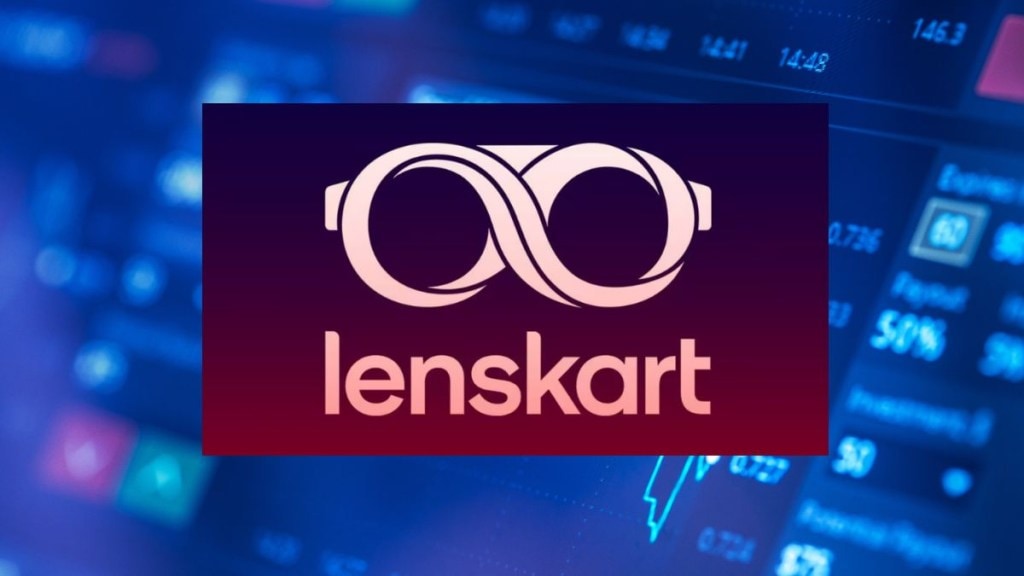Lenskart shares closed 2% higher on the second day on the trit after listing but Ambit Capital has a cautious view on the counter. The brokerage initiated coverage on the eyewear retailer with a ‘Sell’ rating and a target price of Rs 337, implying nearly 19% downside from current levels.
Ambit said that while Lenskart remains a clear leader in India’s organised eyewear market, the stock’s valuation already reflects much of its growth potential. The brokerage values Lenskart at a market capitalisation of about Rs 69,700 crore, noting that its aggressive expansion and manufacturing-led strategy make it an “asset-heavy business with constrained capital efficiency.”
Ambit on Lenskart: Return ratios lag peers
Ambit forecasts “consolidated revenue to grow 20% annually over FY25–FY28 to Rs 11,480 crore, while EBITDA is expected to rise to Rs 1,382 crore by FY28.” Margins are likely to expand by around 630 basis points on the back of higher operating leverage and scale benefits.
However, return on capital employed (RoCE) is expected to remain near 10%, much lower than lifestyle peers such as Trent and Nykaa, where RoCE exceeds 35%.
“Lenskart’s margin expansion and revenue visibility are encouraging, but the capital intensity of manufacturing and expansion keeps RoCE structurally lower,” Ambit said.
Ambit added that the eyewear industry’s inherently lower turnover and high fixed costs make achieving peer-like efficiency difficult in the near term, even with rising scale.
Ambit on Lenskart: Expansion continues but store productivity plateaus
Lenskart ended FY25 with 2,723 stores, including 2,067 in India and 656 overseas. The company’s international push particularly through acquisitions such as Owndays and Stellio has broadened its footprint but also added significant goodwill and overheads.
Ambit expects India’s store count to increase to 3,317 by FY28, with the total network surpassing 4,100 stores globally. Yet, revenue per store is likely to stabilise at around Rs 2.5 crore, signalling a normalisation after years of strong expansion.
“Store productivity has reached a more mature phase after the post-pandemic surge,” the report said. Ambit added that while footfall recovery and category diversification continue, high competition and rising input costs may limit near-term gains.
The brokerage said unit-level economics remain strong, with solid gross margins and efficient inventory turnover. However, it noted that consolidated profitability is weighed down by the heavy fixed costs of manufacturing and international subsidiaries, which dilute overall returns.
Ambit on Lenskart: Heavy capex to keep cash flows under pressure
Lenskart’s growth strategy remains investment-led. Ambit expects the company to spend nearly Rs 2,000 crore between FY25 and FY28, primarily on new manufacturing units and store rollouts.
The brokerage projected negative free cash flow until FY27, turning positive only as capacity utilisation improves in subsequent years. Ambit noted that new manufacturing capacity is typically triggered when existing utilisation reaches about 65%, meaning cash outflows will likely remain elevated in the near term.
“High upfront investment is essential to support long-term scale, but it also postpones the point of sustainable free cash generation,” Ambit said.
Ambit on Lenskart: Valuations rich Vs peers
Even after factoring in a long growth runway, Ambit finds the valuation premium over Trent and Nykaa difficult to justify. “Both these businesses deliver superior capital efficiency, with double-digit free cash generation and RoCE exceeding 35%, compared to Lenskart’s 11% in India,” the report added.
The brokerage pointed out that while Lenskart’s dominance in the organised eyewear segment provides stability, the market may already be pricing in future growth and margin improvement.
Lenskart: Why is Ambit cautious
While Lenskart’s brand strength and category leadership remain intact, Ambit pointed out that the valuations already embed an optimistic growth trajectory.
“Lenskart’s growth engine remains healthy, but valuations are ahead of fundamentals. Until capital efficiency improves, upside looks limited,” the brokerage said.
For investors, the message is measured: Lenskart remains a long-term structural story in India’s consumer market, but near-term returns could stay capped until profitability and free cash flow metrics catch up with its ambition.
Ambit on Lenskart: What could change the stance
Ambit concluded that it could turn more positive if store-level productivity improves faster than expected, leading to stronger operating leverage and earlier free cash flow break-even. A successful turnaround of international operations and better returns from manufacturing investments could also support re-rating, it added.
Key downside risks include slower same-store growth, higher-than-expected capital expenditure, or weaker returns from overseas subsidiaries, which could delay improvement in profitability and cash generation.
Ambit said macro factors such as discretionary demand softness and competition from unorganised players may also add pressure in the medium term.
